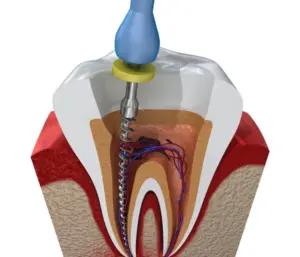
Dental Care has progressed significantly in the past few decades, and several new techniques/methodologies have been developed to let your smile continue. Root canal therapy is one of the standard methods used in the dental field. It is a standard dental procedure for saving damaged or infected teeth, relieving discomfort and preventing further complications. You may feel nervous if you are planning for a root canal treatment for the first time. In this article, we will take you through the entire process of preparing for root canal therapy, step by step. We will also address common concerns about pain management, postoperative care management for a smooth recovery, and some common misconceptions and myths about root canal therapy.
What is Root Canal Therapy?

A tooth’s root canal is the hollow space within the tooth. This space contains the pulp of blood vessels, nerves, and connective tissues. Root canal therapy, or endodontic treatment, is a dental procedure to save a tooth infected or severely damaged. Root canal therapy involves the following general steps:
- Removing the infected or damaged pulp from the tooth’s root canal
- Cleaning and disinfecting the area
- Filling and sealing it to prevent any further infection or damage.
Contrary to popular belief, root canal therapy is not a painful procedure. It is often the best option to save a tooth that would otherwise require extraction.
Signs and Symptoms Indicating The Need For Root Canal Therapy
While only a dental professional can make a definitive diagnosis, some signs and symptoms may indicate you need root canal therapy. The most prominent signs and symptoms include:
- Persistent tooth pain, especially when biting down or applying pressure
- Swelling or tenderness in gums
- Sensitivity to hot or cold temperatures
- Darkening or discoloration of the affected tooth
- Recurring a pimple-like bump on the gums (a sign of abscess)
- A foul taste or odor in the mouth
Experiencing any of these symptoms indicates a severe dental issue and insists you schedule an appointment with a dentist or endodontist.
Why Do You Go For a Root Canal?
It is one of the essential and common treatments in dental clinics or hospitals. Your teeth consist of three major parts, which are:
- Outer Enamel
- Middle Dentin
- Inner Pulp
Sometimes, this pulp becomes infected or inflamed, which can be due to chips, cracks, cavities, decay, or injuries in the teeth. It becomes soft and usually produces intense dental pain. This infected pulp is removed by root canal therapy. You can let your tooth stay intact by treating the infected pulp through the root canal.
Why Do You Feel Afraid Before a Root Canal?
Root canal treatment has a bad reputation as it involves teeth and gums, the sensitive parts of your mouth. Dentists use syringes, different surgery tools, and chemicals during this process. All these factors may scare you from a root canal, and you would look for an alternative. Generally, there are many rumors that a root canal is a painful process. However, a root canal is a painless procedure when done right. It would be best if you were not afraid of this therapy.
Steps Involved in Preparing For Root Canal Therapy
Preparing for root canal therapy involves several essential steps. These steps help you ensure a smooth and successful procedure. These preparations help you minimize discomfort, reduce the risk of complications, and increase the likelihood of a successful dental procedure. The following are the steps required for the preparation of root canal therapy:
Finding the Right Dentist or Endodontist:

The first step in preparing root canal therapy is to find a qualified and experienced dentist or endodontist specializing in this procedure. You may ask friends, family, or your regular dentist for recommendations. You can also research potential practitioners with the necessary expertise and reputation.
Initial Consultation and Dental Examination:
After choosing a dentist or endodontist, schedule an initial consultation with him to discuss the symptoms and concerns about dental problems. If necessary, the dental professional will examine your teeth, gums, and x-rays during this appointment. It will help determine the extent of the damage or infection and whether the root canal therapy is appropriate.
Discussion About Treatment Plan and Options:
After the initial consultation and the examination, you can ask your dentist or endodontist about the recommended treatment plan and any available options. They will explain the procedure in detail, including the steps involved, the expected outcomes, and any other potential risks or complications. Your comfort and ease must be first and foremost when you go for a root canal. If you are going for it for the first time, you may get a lot of questions in your mind. Some common questions that may arise in your can be:

- Is there any possibility of fixing your tooth without a root canal?
- Any alternative options?
- Aftercare of the therapy?
- Cost of the treatment?
- How many meetings will be needed for the entire process?
- Will it hurt?
It would be best if you do not hesitate to share your queries with the density. You will feel relaxed and tension-free when you get proper answers to your questions.
Financial Considerations and Insurance Coverage
Root canal therapy can be a significant investment in your dental health. Discuss the financial aspects of the treatment with your dentist or endodontist. It must include the estimated cost, payment options, and insurance coverage. Understanding the financial aspects of the therapy can help you plan for it and make informed decisions.
Medication Management:
Your dentist may recommend certain pain medications or antibiotics before the root canal therapy. These medications will help you manage any discomfort or infection before the procedure. Follow your dentist’s prescribed dosage and timing instructions carefully.
Fasting and Oral Hygiene:
Depending upon the timing of your appointment and procedure, your dentist may ask you to fast for a certain period before the therapy. It is to ensure that your stomach is empty. It reduces the risk of nausea or other complications during the treatment. Additionally, maintain good oral hygiene thoroughly before the beginning of the treatment.
Anxiety Management:
Dental anxiety is a common observation, especially when undergoing root canal therapy. Discuss your concerns with your dentist or endodontist if you feel anxious or nervous about the procedure. They may provide strategies or options to help you relax during the treatment. The most common strategies used are sedation dentistry and listening to music during the procedure.
Transportation Arrangements:
As discussed earlier, root canal therapy is typically performed under local anesthesia, which means you will be awake but numb during the procedure. Depending upon the type of anesthesia used and your comfort, you may need someone to drive you home after the procedure. So, arrange for transportation in advance to ensure a smooth and stress-free dental procedure experience.
Go For a Full Night Sleep:
Your body must be in top form, like a root canal, before undergoing surgical therapy. You must take a whole night’s sleep before the treatment day. Your body repairs maximum in sleeping mode. It would help if you also slept an entire night after the treatment to let it fix at top speed.
Have some Ice for the Post-Treatment Phase:
Your mouth will be numb after the root canal. It may cause pain as the anesthetic effect starts to diminish. Ice will be the best to alleviate pain and swelling. So, have plenty of ice to use for the post-treatment phase.
Preoperative Instructions:
Before the root canal therapy, you will receive specific instructions from your dentist or endodontist. These guidelines will help you prepare for the procedure. These instructions may include fasting before the appointment, avoiding certain medications, and maintaining good oral hygiene.
These preoperative instructions and preparations will help you be physically and mentally prepared for root canal therapy.
Postoperative Care and Pain Management
After successful root canal therapy, proper postoperative care is required for a smooth and successful recovery. These are the guidelines you can follow to minimize discomfort, reduce the risk of complications, and promote healing:
Managing Pain and Discomfort – Experiencing some degree of pain or discomfort is expected after the root canal treatment. Dentists usually prescribe pain medications or over-the-counter pain relievers for any postoperative discomfort. Follow the prescribed dosage and take the medicines as directed by your dentist.
Avoiding Certain Foods and Activities – Certain foods and activities that can cause damage or dislodging of the temporary filling or crown. Avoid chewing hard or sticky foods on the treated side of your mouth. Moreover, refrain from strenuous activities or exercises that may increase blood pressure or cause trauma to the treated area of the mouth.
Maintaining Good Oral Hygiene – Good oral hygiene is essential for postoperative care and management. You can brush your teeth twice daily and floss at least once daily. However, be gentle around the treated tooth while brushing or flossing, as it may disturb the temporary filling or crown. Also, rinse your mouth with warm salt water to reduce swelling or discomfort in the treated area.
Eating a Soft Diet – In the first few days after the root canal treatment, stick to a soft diet that is easy to chew and swallow. Soft food will minimize the risk of strain on the treated tooth and promote healing. Prefer to use soups, mashed potatoes, yogurt, and smoothies in your meals.
Attending Follow-up Appointments – Attending all the scheduled follow-up appointments with your dentist or endodontist is essential. It will allow them to monitor the progress of the healing process, remove the temporary filling, and place the permanent restoration, such as a dental crown, if necessary.
Following instructions for post-operative care and seeking prompt dental care when required can help you ensure a successful recovery and long-term oral health.
Tips for a Successful Recovery After Root Canal Therapy

Recovering from root canal therapy involves more than just following post-operative care instructions. You can support your healing process and maximize the success of the treatment by implementing these tips:
Maintain a Balanced Diet – Proper nutrition is essential for overall health and healing from root canal therapy. A balanced diet must include a variety of fruits, vegetables, lean proteins, and whole grains. Avoid consuming sugary or acidic food and drinks. These can lead to tooth decay or compromise your oral health.
Stress Management – High levels of stress can negatively impact your immune system. It can hinder the healing process after root canal treatment. Try to engage in stress-reducing activities that will help you relax. These activities may include meditation, deep breathing, exercises, and yoga.
Quit Smoking and Limit Alcohol Consumption – Smoking regularly and excessive alcohol consumption can delay the healing process and lead to further complications. If you are a smoker, consider quitting it or at least reducing tobacco use. Limiting your alcohol consumption can moderate the recovery from the treatment.
Regular Dental Check-ups – Regular dental check-ups and cleaning procedures help in healing after root canal therapy. Routine visits to your dentist allow him to monitor the treated tooth, assess your oral health, and address any concerns or issues related to the healing process.
Ensure Good Oral Hygiene – Regular oral hygiene practices are crucial for optimal oral health after root canal treatment. It includes brushing your teeth at least twice daily with a soft-bristled brush and fluoride toothpaste. Floss daily to remove plaque or debris between your teeth and the gum line.
Common Misconceptions and Myths About Root Canal Therapy:
Root canal therapy often has a negative reputation due to common misconceptions and myths. Following are some common misunderstandings that need to be cleared to prepare you for a root canal treatment:

Extremely Painful Process – One of the most prevalent myths about root canal therapy is that it is an extremely painful procedure. The discomfort during the procedure has been minimized with advancements in dental technology and local anesthesia. Most patients feel relieved from the dental pain they experienced before the root canal treatment.
An Unnecessary Option – There is a belief among some people that it is better to extract a tooth rather than undergo a root canal. Saving your natural tooth through the root canal is always preferred over tooth extraction. Moreover, extracting your tooth can lead to other oral health issues, such as shifting teeth, difficulty chewing, or changes in facial appearance.
Causes Illness – There is another myth that root canal therapy can also lead to systemic illness. This belief originated from outdated research that has already been disproven. According to modern research, root canal therapy is a safe and effective procedure that removes infection from your tooth and promotes oral health.
To understand the truth behind the myth prevailing about root canal therapy, you must consult a dental professional to get accurate information and address any concerns or questions. Relieving these truths will help you alleviate any unnecessary anxiety or fear about root canal therapy.
Final Thoughts:
Root canal therapy has become a comfortable procedure with massive progress in the dental field. It is a dental procedure that requires the expertise and skill of a trained professional, a dentist or endodontist. Early detection, accurate diagnosis, and proper preparation are critical to successful root canal therapy. It is now a painless process, and you can recover from it as soon as possible. But still, it is advised to prepare before the root canal therapy. These preparations help you get proper treatment and a fast recovery. So, don’t delay if you are experiencing tooth pain or sensitivity.

